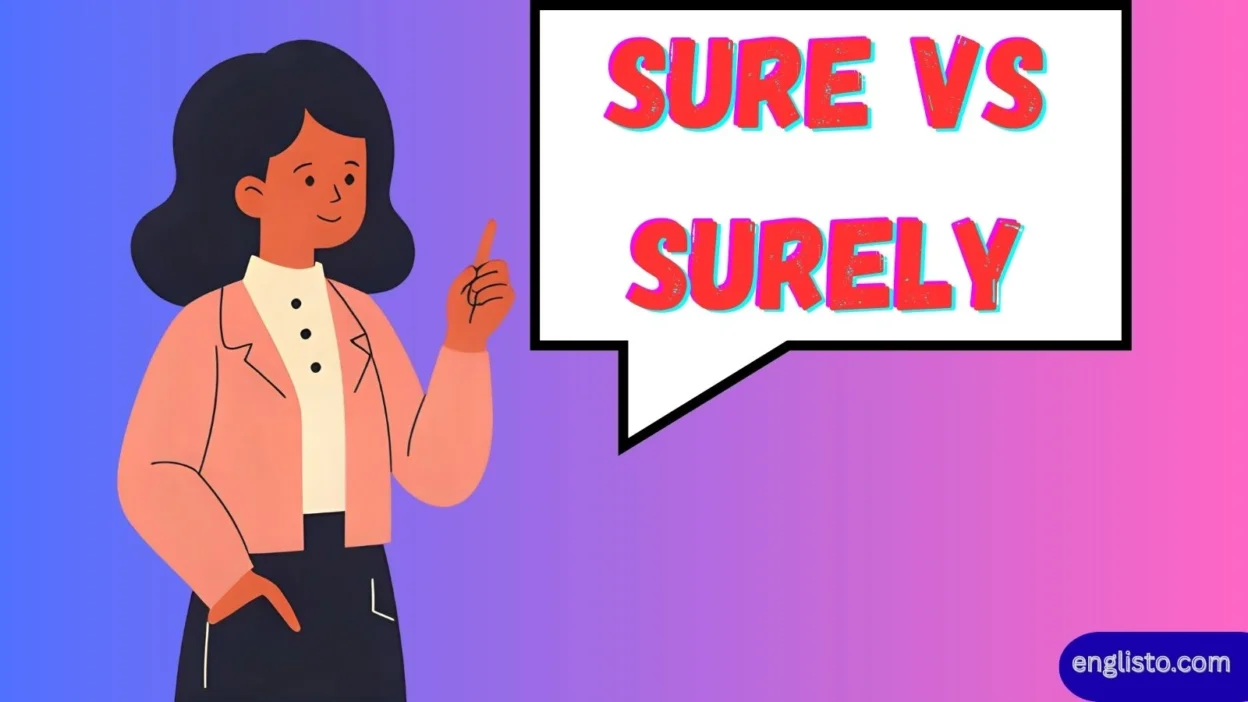Language is full of subtleties that shape how we express ourselves. One common point of confusion in English is the difference between “sure” and “surely.” At first glance, they look almost identical—just one has a -ly suffix. But in practice, they serve different grammatical roles, carry different nuances, and can change the tone and impact of a sentence. Sure vs Surely.
In this guide, we’ll explore “sure” vs. “surely” with real-life examples, grammar breakdowns, synonym tables, idiomatic uses, and practical tips. By the end, you’ll know not just the rules but also how to use these words naturally in conversation and writing.
What Does “Sure” Mean?
“Sure” is primarily an adjective, though in informal contexts it also works as an adverb. Its core meaning revolves around certainty, confidence, and assurance.
- Adjective use: Describes a state of being certain.
- Adverb use (informal, mainly North American English): Used for emphasis or agreement.
Examples of “Sure” as an Adjective
- I’m sure the door is locked.
- She felt sure about her decision.
- Are you sure this stove is turned off?
Here, “sure” modifies pronouns like I and she, expressing a state of confidence.
Examples of “Sure” as an Adverb (Informal)
- “Want to come to the game?” — “Sure!”
- “Could you help me with this math problem?” — “Sure, no problem.”
- North American English often uses “sure” instead of “certainly” or “of course.”
👉 In formal writing, “sure” should not replace “certainly” or “definitely.” But in spoken English, it’s perfectly natural.
Read More: Full Monty – Meaning, Usage & Examples
What Does “Surely” Mean?
“Surely” is an adverb. It emphasizes belief, conviction, or expectation that something is true. It often expresses the speaker’s attitude—sometimes certainty, sometimes surprise or disbelief.
Examples of “Surely” in Sentences
- It will surely rain tomorrow. (Expectation)
- You’re not surely quitting your job, are you? (Disbelief)
- The team will surely win the championship this year. (Confidence)
Unlike “sure,” which can stand alone as a response, “surely” cannot. You won’t hear someone answer just “Surely!” in casual conversation.
Core Difference Between “Sure” and “Surely”
Here’s a side-by-side comparison:
| Feature | Sure | Surely |
| Part of Speech | Adjective (mostly), Adverb (informal) | Adverb only |
| Formality | Informal, conversational | More formal, literary, dramatic |
| Usage in Speech | Common in everyday English | Less common, often emphatic |
| Tone | Agreement, confidence | Emphasis, conviction, disbelief |
| Examples | “I’m sure about it.” / “Sure!” | “It will surely happen.” |
Takeaway:
- Use “sure” when describing certainty or casually agreeing.
- Use “surely” when you want to emphasize belief, surprise, or expectation in a sentence.
Grammar Breakdown: Adjective vs. Adverb
Sure = Adjective
- Modifies nouns/pronouns.
- Expresses a state of being certain.
Example:
- He is sure about the outcome.
Surely = Adverb
- Modifies verbs, adjectives, or other adverbs.
- Adds emphasis or intensity.
Example:
- She will surely realize the truth.
Real-Life Usage in Conversations
Dialogue with “Sure”:
- A: “Can you come to the meeting at 2 pm?”
- B: “Sure. I’ll be there.”
Dialogue with “Surely”:
- A: “Did Brian really quit after 10 years at the company?”
- B: “Surely you’re joking!”
Notice how “sure” feels casual and cooperative, while “surely” adds emotional weight.
Idioms and Expressions with “Sure” and “Surely”
- For sure → means definitely, without doubt.
- He’ll be promoted, for sure.
- He’ll be promoted, for sure.
- Make sure → means confirm or verify.
- Make sure the front door is locked tonight.
- Make sure the front door is locked tonight.
- Sure enough → means as expected.
- Sure enough, the sun rose at 6:00 am.
- Sure enough, the sun rose at 6:00 am.
- Surely not → disbelief or shock.
- Surely not! You can’t be serious.
- Surely not! You can’t be serious.
Formal vs. Informal Contexts
| Context | Prefer “Sure” | Prefer “Surely” |
| Casual speech | Yes | Rare |
| Formal writing | Avoid | Acceptable |
| Politeness | Neutral | Adds intensity |
| Dramatic emphasis | Weak | Strong |
👉 In business emails, “surely” can sound too dramatic or old-fashioned. Instead, use “certainly” or “definitely.”
Synonyms and Alternatives
| Word/Phrase | Similar to | Use Case |
| Certainly | Surely | Formal confirmations |
| Definitely | Sure/Surely | Strong conviction |
| Of course | Sure | Casual agreement |
| Without doubt | Surely | Serious emphasis |
| Absolutely | Both | Informal + emphatic |
Common Mistakes Learners Make
- ❌ “I’m surely about it.” → Incorrect.
- ✅ “I’m sure about it.”
- ❌ “He will sure come.” (formal)
- ✅ “He will surely come.”
- ❌ Using “surely” as a standalone answer.
- ✅ Use “sure” or “certainly” instead.
Practical Tips to Master “Sure” vs. “Surely”
- Use “sure” in casual spoken English.
- Use “surely” to emphasize belief in formal or dramatic contexts.
- Avoid mixing them up in academic or professional writing.
- Listen to native speakers: Americans use “sure” a lot; British speakers often prefer “certainly.”
Practice Exercises
Fill in the blanks with sure or surely:
- I’m _____ this is the right solution.
- You’re not _____ leaving without saying goodbye?
- “Can you pass me the salt?” — “____.”
- The road is _____ exciting to travel.
- They will _____ raise concerns at the meeting.
FAQs on “Sure vs Surely”
Q1: Can “sure” and “surely” be used interchangeably?
No. “Sure” is often casual or adjectival, while “surely” emphasizes conviction or disbelief.
Q2: Is “sure” American English and “surely” British English?
Not exactly. “Sure” is more common in North American informal speech, but both are used in Britain.
Q3: Is it wrong to say “He will sure win”?
In informal American English, it’s heard, but in formal contexts the correct choice is “He will surely win.”
Q4: What’s the difference between “sure” and “certain”?
Both mean confident or without doubt, but “certain” is slightly more formal and stronger.
Q5: Can I use “surely” in polite responses?
Not as a direct response. Use “sure,” “certainly,” or “of course” instead.
Conclusion: Mastering the Subtle Distinction
Understanding “sure vs surely” isn’t just about grammar—it’s about tone, intention, and context.
- “Sure” works as an adjective and a casual adverb, especially in North American English, expressing confidence or simple agreement.
- “Surely” is strictly an adverb, used to emphasize belief, disbelief, or expectation—often more dramatic or formal.
When you’re at a party, chatting with friends, or responding quickly, go with “sure.”
When you’re writing, persuading, or expressing strong conviction, lean on “surely.”
Language is about more than rules—it’s about communicating meaning clearly. With these distinctions in mind, you can use both words effectively and avoid miscommunication.



